Jesse Richards's Blog, page 6
September 30, 2013
The teen pregnancy epidemic
... is not real. From Slate.com, via The Week: "The U.S. teen birthrate dropped 6 percent between 2011 and 2012, and is now the lowest it's been in the 73 years the government has been tracking it." And this is most likely the lowest in the country's history, since people had children at much younger ages in the past in general (even if they happened to be married).
A small part of me thought that maybe this meant teens were getting more abortions, but I looked that up, and nope, that dropped, too, and precipitously:
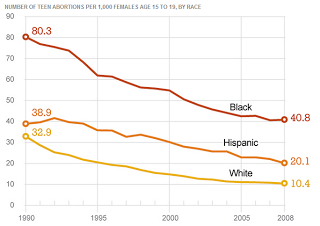
(The chart is from familyfacts.org.) So why all the good news? Well, health experts theorize that the most likely culprits are good ol' increased sex education and more readily-available contraception. Keep up the good work, kids! Good job being too busy texting to get pregnant.
A small part of me thought that maybe this meant teens were getting more abortions, but I looked that up, and nope, that dropped, too, and precipitously:

(The chart is from familyfacts.org.) So why all the good news? Well, health experts theorize that the most likely culprits are good ol' increased sex education and more readily-available contraception. Keep up the good work, kids! Good job being too busy texting to get pregnant.
Published on September 30, 2013 20:38
July 31, 2013
An admirable apology
We are all well aware of the Supreme Court's big decisions regarding gay rights last month. But you might not have heard the parallel story of Exodus International. They were the driving force behind “conversion therapy”, the movement that “helps” gays and lesbians change their sexual orientation through prayer and therapy. Well, they just announced that they were closing and that they had been wrong all along. The founder apologized for all the “pain and hurt” the organization had caused, regretting breaking up gay relationships, and saying now that gay couples can be “every bit as capable of being amazing parents.” (from The Week, July 5-12, 2013)
This seems pretty remarkable to me, since it's rare to hear public apologies that aren't required by law or necessary to win votes. It would have been much more likely for this organization to simply dwindle away until they ran out of business and the last guy closed the doors and slinked away, never mentioning his former "career" to any of his new coworkers at whatever more normal job he ended up at. Not that an apology makes up for the incalculable amount of absurd pain the organization caused, but it's still a nice gesture.
This announcement of course dovetails nicely with the Supreme Court’s historic decisions. The Court is in step with public opinion, which has been changing fast, perhaps faster than for any other marginalized group in history. Here are some charts from the New York Times’ Nate Silver:
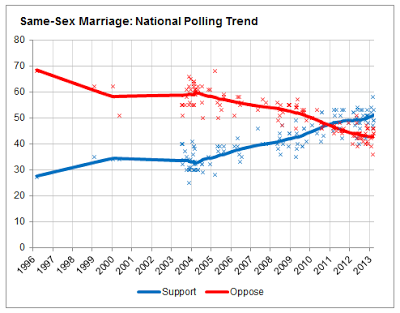 source 1
source 1
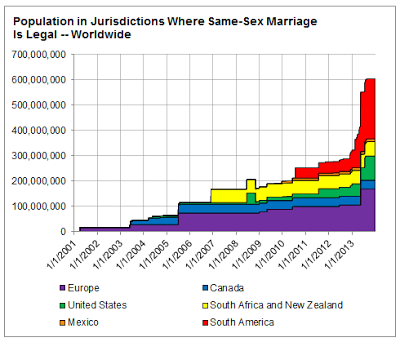 source 2
source 2
The first chart focuses on the U.S., and the second on the world. It's interesting that both articles focus on same-sex marriage, and in recent years it's intrigued me that this is the locus of our debate about gay rights. It's not that marriage isn't an important issue, but it's worth remembering that in previous civil rights movements in earlier decades and centuries, groups were fighting for equal representation in voting, in hiring and pay, and in ending violent acts (lynching, burning, you name it.) It's a sign of progress that those issues thankfully don't need to be the primary concern of this particular fight for equal rights today.
This seems pretty remarkable to me, since it's rare to hear public apologies that aren't required by law or necessary to win votes. It would have been much more likely for this organization to simply dwindle away until they ran out of business and the last guy closed the doors and slinked away, never mentioning his former "career" to any of his new coworkers at whatever more normal job he ended up at. Not that an apology makes up for the incalculable amount of absurd pain the organization caused, but it's still a nice gesture.
This announcement of course dovetails nicely with the Supreme Court’s historic decisions. The Court is in step with public opinion, which has been changing fast, perhaps faster than for any other marginalized group in history. Here are some charts from the New York Times’ Nate Silver:
 source 1
source 1
 source 2
source 2
The first chart focuses on the U.S., and the second on the world. It's interesting that both articles focus on same-sex marriage, and in recent years it's intrigued me that this is the locus of our debate about gay rights. It's not that marriage isn't an important issue, but it's worth remembering that in previous civil rights movements in earlier decades and centuries, groups were fighting for equal representation in voting, in hiring and pay, and in ending violent acts (lynching, burning, you name it.) It's a sign of progress that those issues thankfully don't need to be the primary concern of this particular fight for equal rights today.
Published on July 31, 2013 20:53
July 6, 2013
Yet another good vaccine
This is from last week's The Week, "The lifesaving effect of HPV vaccines". A new study has shown the new HPV vaccine to be very effective. "The rate of infection with the cancer-causing strain of HPV has been cut in half among American teenage girls since 2006, when the [CDC] first recommended [the vaccination]." That's particularly impressive since the vaccine is controversial and so only a third of young girls have received it. HPV is the primary cause of cervical cancer, and if we were able to up vaccination levels to 80% (like many other countries have done), we would prevent an estimated 17,000 more cancer deaths. Let's do that.
Published on July 06, 2013 06:34
June 9, 2013
Extreme poverty may disappear in our lifetimes, if we just keep up the good work
It never ceases to amaze me how much success the world has seen in reducing poverty, and even more, how few people know about it. This is probably for three reasons: we're more aware of poverty (and bad news in general) than in the past thanks to the explosion of news, our standards have been constantly increasing, and we're aware that global population is increasing (although that rate of growth is actually decreasing, another stat we're unaware of.) I think these combine to make our gut feeling that dire poverty is increasing. Thankfully, that's not true.
It seems more obvious when you realize that we've never been richer than we are today. Throughout most of history, ALL people were in dire poverty, or near to all. For every one king with a bit of gold, there were thousands of peasants. There was no middle class to speak of until recent centuries. And then during the twentieth century, poverty reduction really took of.
I have a chart in my book that shows this reduction in extreme poverty, which I've reproduced often:
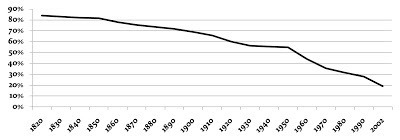
But here's a new one, from an Economist article this week:
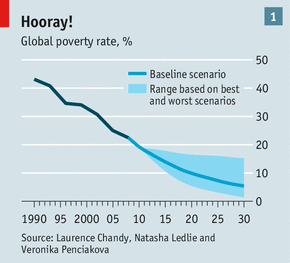
The Economist is generally more optimistic than many publications, but still, it's not often you see global stats simple labeled, "Hooray!" (Although the subtitle should say "Global extreme poverty rate, %", an important distinction. Extreme poverty is defined as people living on less than $1.25 a day. General poverty will be with us much longer.)
What makes this chart new to me is it's the first one I've seen with projections 20 years into the future. And those projections are amazing! Look, even in the worst case scenario, we're still reducing poverty, just slowly. And in the best case scenario, it's practically gone by 2030. This is stunning, and contrary to all our assumptions. Read the whole Economist article for their suggestions on the best ways to make the most progress in the coming years.
It seems more obvious when you realize that we've never been richer than we are today. Throughout most of history, ALL people were in dire poverty, or near to all. For every one king with a bit of gold, there were thousands of peasants. There was no middle class to speak of until recent centuries. And then during the twentieth century, poverty reduction really took of.
I have a chart in my book that shows this reduction in extreme poverty, which I've reproduced often:

But here's a new one, from an Economist article this week:

The Economist is generally more optimistic than many publications, but still, it's not often you see global stats simple labeled, "Hooray!" (Although the subtitle should say "Global extreme poverty rate, %", an important distinction. Extreme poverty is defined as people living on less than $1.25 a day. General poverty will be with us much longer.)
What makes this chart new to me is it's the first one I've seen with projections 20 years into the future. And those projections are amazing! Look, even in the worst case scenario, we're still reducing poverty, just slowly. And in the best case scenario, it's practically gone by 2030. This is stunning, and contrary to all our assumptions. Read the whole Economist article for their suggestions on the best ways to make the most progress in the coming years.
Published on June 09, 2013 07:57
April 29, 2013
Even your teeth are getting better
I got a friendly dental reminder from ZocDoc today, and naturally that made me wonder how much better we’re doing with our teeth as a society. Here are some tidbits from Stephen Moore and Julian Simon’s It’s Getting Better All the Time. (Keep in mind that since that book came out in 2000, these stats are probably even better now.)
They write, "The father of our country, George Washington, had wooden teeth. Most of our grandparents wore dentures (if they could afford them) because their teeth had rotted away. But due to modern dental care, better oral hygiene, and fluoridated water, far fewer Americans than ever before lose their teeth.” Some stats:
Average Americans have 3 more teeth today (2000) than they did in 1970 (21 then, versus 24 now). Americans in general keep their teeth about 10 years longer than they did in the 1960s. The average 55 to 64-year-old now has 4 more of their real teeth than that age group did 20 years ago.

More details and charts can be found in this CDC report.
They write, "The father of our country, George Washington, had wooden teeth. Most of our grandparents wore dentures (if they could afford them) because their teeth had rotted away. But due to modern dental care, better oral hygiene, and fluoridated water, far fewer Americans than ever before lose their teeth.” Some stats:
Average Americans have 3 more teeth today (2000) than they did in 1970 (21 then, versus 24 now). Americans in general keep their teeth about 10 years longer than they did in the 1960s. The average 55 to 64-year-old now has 4 more of their real teeth than that age group did 20 years ago.

More details and charts can be found in this CDC report.
Published on April 29, 2013 17:44
March 21, 2013
Why NOT to eat local, organic food
Every day we are forced to make decisions about food. What should we believe? Should we care about eating local, or eating organic, or even eating meat? I used to ignore some of these issues, but now I think it's essential for anyone who cares about saving lives worldwide, and/or protecting the environment, to care about them. But HOW we should care may surprise you.

Just Food is a riveting book that has the power to change a lot of our day-to-day assumptions about food. The book is written by a former local-food activist, James E. McWilliams, who had a change of heart as he uncovered scientific evidence opposing his beliefs. His book's important arguments:
Consider each food issue separately. We tend to group all the food issues together into "ethical" v. "conventional". Someone who is concerned about GMO foods probably also supports organic food and local food, for example. In reality, each issue should be scientifically evaluated on its own merits. These issues include: local v. non-local, organic v. conventional, GMO v. non-GMO, vegetarian vs. meat, use of pesticides (and in fact evaluating each one), overuse of antibiotics, ethical treatment of animals, gluten-free food, large corporations v. small farms, and more. I encourage you to research each of these issues for yourself, one at a time. You might come to a different combination of conclusions, based on the evidence you find. Below is what I have found, which mostly lines up with what McWilliams puts forth so well in Just Food.
Do NOT eat local, mostly. Locavores deify "food miles" as important because the more food travels, the more pollution and energy used in transport, right? Well, the math doesn't add up. First, it's important to note that transportation is only 11% of total food production energy expenditure. Second, "food miles" don't factor in economies of scale. If a huge truck transports 1,000 tomatoes from 1,000 miles away, each tomato costs 1 mile of energy. If a friendly local farmer transports 50 tomatoes from 100 miles away, his tomatoes have each used 2 miles of energy. That's a simple example, but you get the point: Local does not necessarily use less energy.
Third, most environments are not designed for all foods. If I get local fruit in NYC in January, it's possible it was grown in a greenhouse, which uses TONS of energy. So, if you live in Florida, by all means eat local oranges. But in most places, it makes sense to truck in food from the places it grows best. If you want to eat local just because you think it tastes better, that's your prerogative, but know that many people can't tell the difference in taste tests, AND it's worse for the environment.
Do NOT eat "organic", ever. I've been trying to follow this advice for years now, ever since I read these two excellent Skeptoid articles. Here's the basic logic: If pesticides are so harmful, why does non-organic agriculture use them? Because they increase crop yield, and save money and energy. Organic food thus has a lower crop yield, which means it takes more land to grow the same amount. Which means that lots of formerly-wild land and forests are being destroyed to make way for organic food. It's so ironic, and ridiculous.
In addition, you might be surprised to learn that organic farming still uses tons of pesticides, they just have to be "naturally derived". Some of these are arguably more harmful to the environment than "un-natural" chemicals, especially since organic farms use a lot more of them (since they are less effective). To top it off, nothing has ever conclusively shown that organic food is healthier in any way, or that conventionally-grown food is harmful. Please stop supporting this snake oil industry.
Support GMO foods. Here's where the "saving lives worldwide" comes into play. Simply put, our trendy food fads are rich indulgences that a majority of the world can't partake in. That would be fine, if they didn't also HURT the rest of the world. Abstaining from genetically-modified foods - for no good reason, since they have never been shown to cause any harm - reduces the demand for them, and thus their research & development. This is bad, because they have the potential to drastically help starving people in the developing world. In fact, they may be the only thing that can … it's hard to imagine a solution to the world's current hunger problems that doesn't include GMO foods in a big way. They also drastically reduce pesticide use, which is why it's so weird that environmentalists oppose them (which has always felt to me akin to a church wanting fewer abortions but also opposing birth control). Theoretically, increased GMO use could eventually render the concept of organic food moot.
Anti-GMO advocates cite the "precautionary principle": we don't know if they might have bad side effects, so we should steer clear of them just in case. Except they never take the other side of the equation into account, namely that we do know that a world without GMO foods has bad side effects: millions of people die. It's unlikely that the bad side effects of GMO foods would be worse than that.
Whole Foods recently announced it's going to start labeling all GMO foods. Good … buy them.
Go vegetarian - even a little bit. One area where McWilliams argues along the traditional environmental lines is to advocate eating less meat. After driving cars, eating meat is probably the single thing we do as individuals that most negatively impacts the environment. We can either eat a plant that got its energy from the sun, or eat a cow that had to eat 1,000 plants over its lifetime. That's a huge difference in energy used. Cows and other animals also use up huge amounts of land for grazing. And there are a whole host of other issues that make eating meat questionable at best. Many people in developing countries are just starting to eat meat at rates approaching us in the U.S., but the earth simply will not be able to support everyone eating meat at this new higher rate.
McWilliams put his money where his mouth is and decided to become a vegetarian. He admits it's extremely hard, so wisely advocates a compromise: if you can't convert to full veganism, just try to eat less meat, even starting with a little bit less. Cow meat is the worst in terms of the environmental impact; fish aren't nearly as bad. McWilliams envisions a sustainable future in which meat is treated as a delicacy we all partake of occasionally, rather than every meal.
Support good businesses, whether big or small. Another point of contention is the conflict between giant corporate agribusiness on the one hand and small, local family farms on the other. This is a weird, partially made-up debate consisting of stereotypes. Do we all want to become farmers again? Only 2% of Americans currently work as farmers, and this is due to the economies of scale gained by large corporations over the last 100 years. In addition, there would be millions - perhaps billions - more starving people if it weren't for "big business" in food production. And only big business can take us the rest of the way as well: we're not going to be able to feed the world with small farms.
It's still obvious, though, that agricultural corporations have a lot of problems today. However, none of these are intrinsic to the concept of a large business, and they can be reformed. More importantly, there's nothing that states that a small business is going to be inherently more ethical. Both are just made up of people.
Do NOT cook at home. It's weird that locavores have fixated on optimizing the energy efficiency of transportation when there are many other energy-hogging steps of food production. (For example, studies have shown that people burn more energy in their cars to get to farmer's markets to buy local organic food, since these tend to be farther away than grocery stores.) Cooking at home is a huge expenditure of energy. Imagine using one whole oven and all its heat just to cook one meal, versus a restaurant using a larger oven to cook 100 meals. Restaurants simply use less energy per meal than home cooking does.
McWilliams only mentions this issue briefly. Admittedly, this one is a hard sell. We all can't afford to eat out every day. But it's another example of how thinking about each step in our food consumption process can help us question our assumptions about what is healthiest and what is best for the planet.All of the issues above have been drastically oversimplified in order to present them here. They are complex issues that resist easy solutions. None of the things I advocate above imply that our current, "conventional" food system doesn't have terrible flaws that should be reformed. I encourage you to read Just Food and anything else you can find, and come to your own objective conclusions about what food choices to make to best support yourself, your family, the environment, and all the world's people.

Just Food is a riveting book that has the power to change a lot of our day-to-day assumptions about food. The book is written by a former local-food activist, James E. McWilliams, who had a change of heart as he uncovered scientific evidence opposing his beliefs. His book's important arguments:
Consider each food issue separately. We tend to group all the food issues together into "ethical" v. "conventional". Someone who is concerned about GMO foods probably also supports organic food and local food, for example. In reality, each issue should be scientifically evaluated on its own merits. These issues include: local v. non-local, organic v. conventional, GMO v. non-GMO, vegetarian vs. meat, use of pesticides (and in fact evaluating each one), overuse of antibiotics, ethical treatment of animals, gluten-free food, large corporations v. small farms, and more. I encourage you to research each of these issues for yourself, one at a time. You might come to a different combination of conclusions, based on the evidence you find. Below is what I have found, which mostly lines up with what McWilliams puts forth so well in Just Food.
Do NOT eat local, mostly. Locavores deify "food miles" as important because the more food travels, the more pollution and energy used in transport, right? Well, the math doesn't add up. First, it's important to note that transportation is only 11% of total food production energy expenditure. Second, "food miles" don't factor in economies of scale. If a huge truck transports 1,000 tomatoes from 1,000 miles away, each tomato costs 1 mile of energy. If a friendly local farmer transports 50 tomatoes from 100 miles away, his tomatoes have each used 2 miles of energy. That's a simple example, but you get the point: Local does not necessarily use less energy.
Third, most environments are not designed for all foods. If I get local fruit in NYC in January, it's possible it was grown in a greenhouse, which uses TONS of energy. So, if you live in Florida, by all means eat local oranges. But in most places, it makes sense to truck in food from the places it grows best. If you want to eat local just because you think it tastes better, that's your prerogative, but know that many people can't tell the difference in taste tests, AND it's worse for the environment.
Do NOT eat "organic", ever. I've been trying to follow this advice for years now, ever since I read these two excellent Skeptoid articles. Here's the basic logic: If pesticides are so harmful, why does non-organic agriculture use them? Because they increase crop yield, and save money and energy. Organic food thus has a lower crop yield, which means it takes more land to grow the same amount. Which means that lots of formerly-wild land and forests are being destroyed to make way for organic food. It's so ironic, and ridiculous.
In addition, you might be surprised to learn that organic farming still uses tons of pesticides, they just have to be "naturally derived". Some of these are arguably more harmful to the environment than "un-natural" chemicals, especially since organic farms use a lot more of them (since they are less effective). To top it off, nothing has ever conclusively shown that organic food is healthier in any way, or that conventionally-grown food is harmful. Please stop supporting this snake oil industry.
Support GMO foods. Here's where the "saving lives worldwide" comes into play. Simply put, our trendy food fads are rich indulgences that a majority of the world can't partake in. That would be fine, if they didn't also HURT the rest of the world. Abstaining from genetically-modified foods - for no good reason, since they have never been shown to cause any harm - reduces the demand for them, and thus their research & development. This is bad, because they have the potential to drastically help starving people in the developing world. In fact, they may be the only thing that can … it's hard to imagine a solution to the world's current hunger problems that doesn't include GMO foods in a big way. They also drastically reduce pesticide use, which is why it's so weird that environmentalists oppose them (which has always felt to me akin to a church wanting fewer abortions but also opposing birth control). Theoretically, increased GMO use could eventually render the concept of organic food moot.
Anti-GMO advocates cite the "precautionary principle": we don't know if they might have bad side effects, so we should steer clear of them just in case. Except they never take the other side of the equation into account, namely that we do know that a world without GMO foods has bad side effects: millions of people die. It's unlikely that the bad side effects of GMO foods would be worse than that.
Whole Foods recently announced it's going to start labeling all GMO foods. Good … buy them.
Go vegetarian - even a little bit. One area where McWilliams argues along the traditional environmental lines is to advocate eating less meat. After driving cars, eating meat is probably the single thing we do as individuals that most negatively impacts the environment. We can either eat a plant that got its energy from the sun, or eat a cow that had to eat 1,000 plants over its lifetime. That's a huge difference in energy used. Cows and other animals also use up huge amounts of land for grazing. And there are a whole host of other issues that make eating meat questionable at best. Many people in developing countries are just starting to eat meat at rates approaching us in the U.S., but the earth simply will not be able to support everyone eating meat at this new higher rate.
McWilliams put his money where his mouth is and decided to become a vegetarian. He admits it's extremely hard, so wisely advocates a compromise: if you can't convert to full veganism, just try to eat less meat, even starting with a little bit less. Cow meat is the worst in terms of the environmental impact; fish aren't nearly as bad. McWilliams envisions a sustainable future in which meat is treated as a delicacy we all partake of occasionally, rather than every meal.
Support good businesses, whether big or small. Another point of contention is the conflict between giant corporate agribusiness on the one hand and small, local family farms on the other. This is a weird, partially made-up debate consisting of stereotypes. Do we all want to become farmers again? Only 2% of Americans currently work as farmers, and this is due to the economies of scale gained by large corporations over the last 100 years. In addition, there would be millions - perhaps billions - more starving people if it weren't for "big business" in food production. And only big business can take us the rest of the way as well: we're not going to be able to feed the world with small farms.
It's still obvious, though, that agricultural corporations have a lot of problems today. However, none of these are intrinsic to the concept of a large business, and they can be reformed. More importantly, there's nothing that states that a small business is going to be inherently more ethical. Both are just made up of people.
Do NOT cook at home. It's weird that locavores have fixated on optimizing the energy efficiency of transportation when there are many other energy-hogging steps of food production. (For example, studies have shown that people burn more energy in their cars to get to farmer's markets to buy local organic food, since these tend to be farther away than grocery stores.) Cooking at home is a huge expenditure of energy. Imagine using one whole oven and all its heat just to cook one meal, versus a restaurant using a larger oven to cook 100 meals. Restaurants simply use less energy per meal than home cooking does.
McWilliams only mentions this issue briefly. Admittedly, this one is a hard sell. We all can't afford to eat out every day. But it's another example of how thinking about each step in our food consumption process can help us question our assumptions about what is healthiest and what is best for the planet.All of the issues above have been drastically oversimplified in order to present them here. They are complex issues that resist easy solutions. None of the things I advocate above imply that our current, "conventional" food system doesn't have terrible flaws that should be reformed. I encourage you to read Just Food and anything else you can find, and come to your own objective conclusions about what food choices to make to best support yourself, your family, the environment, and all the world's people.
Published on March 21, 2013 06:46
February 18, 2013
Thanks, presidents, for promoting democracies
Happy President's Day! Let's celebrate with some info about democracies.
The benefits of democracy as a form of government necessary in every country have been much debated, particularly in the past decade since President Bush used "spreading democracy" as one of the many reasons behind several unpopular wars. Sure, democracy is great for us, but do we have the right to insist upon it in every other country as well? Well, we certainly don't have the ability to impose it everywhere, as we learned, (and the very concept is contradictory), but as Steven Pinker writes in The Better Angels of Our Nature, there is an excellent reason to promote democracy worldwide: democracies are less violent.
He writes, "From 1955 to 2008 autocracies were three and a half times more likely to commit genocides than were full or partial democracies … democracies are less likely to wage interstate wars, to have large-scale civil wars, and to commit genocides." Totalitarian governments of the 20th century racked up a death toll of 4 percent of their populations, authoritarian governments killed 1 percent, but democracies only killed four tenths of 1 percent. He posits that democracies are a vaccine to the spread of virulent ideologies, a way to make sure bad ideas are more often eclipsed by good ones. So it's great news that the number of democracies is growing, as shown in this chart from that book:
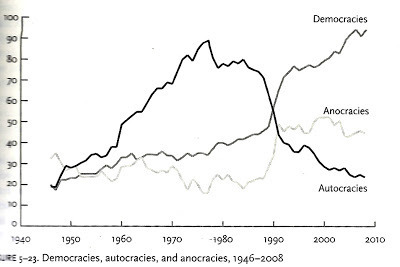
Openness to trade is another big factor in making a state less violent, too. The more international trade a country has, the less likely they are to fight wars. This is the type of stuff Kant theorized about centuries ago; we now have the data to back the theories up. So, this President's Day, let's give the presidents a thank-you for centuries of maintaining our relatively stable, open democracy ... not just for ourselves but for serving as an example worldwide.

James Monroe, by John Vanderlyn
The benefits of democracy as a form of government necessary in every country have been much debated, particularly in the past decade since President Bush used "spreading democracy" as one of the many reasons behind several unpopular wars. Sure, democracy is great for us, but do we have the right to insist upon it in every other country as well? Well, we certainly don't have the ability to impose it everywhere, as we learned, (and the very concept is contradictory), but as Steven Pinker writes in The Better Angels of Our Nature, there is an excellent reason to promote democracy worldwide: democracies are less violent.
He writes, "From 1955 to 2008 autocracies were three and a half times more likely to commit genocides than were full or partial democracies … democracies are less likely to wage interstate wars, to have large-scale civil wars, and to commit genocides." Totalitarian governments of the 20th century racked up a death toll of 4 percent of their populations, authoritarian governments killed 1 percent, but democracies only killed four tenths of 1 percent. He posits that democracies are a vaccine to the spread of virulent ideologies, a way to make sure bad ideas are more often eclipsed by good ones. So it's great news that the number of democracies is growing, as shown in this chart from that book:

Openness to trade is another big factor in making a state less violent, too. The more international trade a country has, the less likely they are to fight wars. This is the type of stuff Kant theorized about centuries ago; we now have the data to back the theories up. So, this President's Day, let's give the presidents a thank-you for centuries of maintaining our relatively stable, open democracy ... not just for ourselves but for serving as an example worldwide.

James Monroe, by John Vanderlyn
Published on February 18, 2013 09:15
January 25, 2013
Amazing science advances in 2012 that you may not have heard about
Science made a lot of breakthroughs this year, and you probably didn't hear about them all. Check out this article on Buzzfeed for 27 of them. Here are some of my favorites:
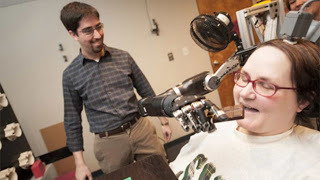
Bionic Woman: They gave a woman a bionic arm that she controls with her mind, and apparently its primary purpose is to keep chocolate away from ravenous scientists, as evidenced in the photo above. This is straight-up Luke Skywalker stuff, people. Here's a whole article about it.Spray-on Skin: Imagine spraying something onto burn victims that will grow skin back over an entire area. The best part is, the material is grown from a sample of the person's own skin.James Cameron reaches the bottom of the ocean: Better he spends his time doing this than making another Avatar.Self-driving cars: They're now legal in 3 states. Want to place bets on if they'll get in more accidents than human drivers? No, because you would lose - it's impossible to get in more accidents than us.
Check out the article to see 23 more crazy things.

Bionic Woman: They gave a woman a bionic arm that she controls with her mind, and apparently its primary purpose is to keep chocolate away from ravenous scientists, as evidenced in the photo above. This is straight-up Luke Skywalker stuff, people. Here's a whole article about it.Spray-on Skin: Imagine spraying something onto burn victims that will grow skin back over an entire area. The best part is, the material is grown from a sample of the person's own skin.James Cameron reaches the bottom of the ocean: Better he spends his time doing this than making another Avatar.Self-driving cars: They're now legal in 3 states. Want to place bets on if they'll get in more accidents than human drivers? No, because you would lose - it's impossible to get in more accidents than us.
Check out the article to see 23 more crazy things.
Published on January 25, 2013 19:03
December 30, 2012
More intriguing facts about guns
I did an update in April with some positive gun stats, but in the wake of the Connecticut school shooting, and seeing tons of articles now floating around, I thought I'd revisit the topic. When things like this happen - as they do, on a regular basis - I invariably see several posts or comments from friends that run along the lines of "The world is a terrible place." It's hard to argue with that when a crazy man murders 20 schoolchildren, because it's demonstrably true. However, it's more viable to argue with the similar sentiments of, "The world is getting worse," or "Things are worse than they've ever been," or "What is the world coming to," which I also see commonly. Those ideas are demonstrably untrue. The world may be a terrible place, but there's a lot of evidence that it used to be even worse. Here a chart from Kieran Healy, Associate Professor at Duke:
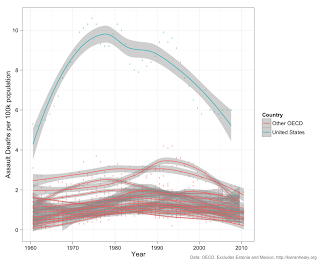 It shows two clear things: America has a much higher rate of assault deaths than other comparable countries, and that rate has been declining in the past 30 years. This decline mirrors the stats I had listed in my previous blog post, that 1 in 5 Americans now owns a gun (down from 1 in 3 in 1980) and that there are now guns in 1 in 3 households (down from 1 in 2 in 1973.)
It shows two clear things: America has a much higher rate of assault deaths than other comparable countries, and that rate has been declining in the past 30 years. This decline mirrors the stats I had listed in my previous blog post, that 1 in 5 Americans now owns a gun (down from 1 in 3 in 1980) and that there are now guns in 1 in 3 households (down from 1 in 2 in 1973.)
Besides that decline, what else is good news? Well, that other countries have learned what we Americans have not yet come to terms with. Specifically, the UK and Australia both had shooting incidents happen, passed stricter laws, and then saw shootings decline. Precipitously.
Noelle Stevenson, an artist I follow on Tumblr, reposted this (it cites many sources, which you can track back from that link):
What is the Secret Peace viewpoint on more gun control? It'll happen eventually in this country. I think more gun control makes sense, and it's an area where the U.S. embarrassingly lags behind other developed nations. However, there is a trade-off that we shouldn't ignore, as sacrificing some of our freedoms to have whatever guns we want means also giving up the freedom of the possibility of armed rebellion against a theoretically tyrannical government, which is what the Founders wrote the whole Second Amendment for. But I think at this point the trade-off would be well worth it. A government would have to be extremely tyrannical for a very long number of years to come close to killing as many of its citizens as guns have in the United States.
 It shows two clear things: America has a much higher rate of assault deaths than other comparable countries, and that rate has been declining in the past 30 years. This decline mirrors the stats I had listed in my previous blog post, that 1 in 5 Americans now owns a gun (down from 1 in 3 in 1980) and that there are now guns in 1 in 3 households (down from 1 in 2 in 1973.)
It shows two clear things: America has a much higher rate of assault deaths than other comparable countries, and that rate has been declining in the past 30 years. This decline mirrors the stats I had listed in my previous blog post, that 1 in 5 Americans now owns a gun (down from 1 in 3 in 1980) and that there are now guns in 1 in 3 households (down from 1 in 2 in 1973.)Besides that decline, what else is good news? Well, that other countries have learned what we Americans have not yet come to terms with. Specifically, the UK and Australia both had shooting incidents happen, passed stricter laws, and then saw shootings decline. Precipitously.
Noelle Stevenson, an artist I follow on Tumblr, reposted this (it cites many sources, which you can track back from that link):
"'On March 13, 1995, in the small Scottish town of Dunblane, a forty-three-year-old man, Thomas Hamilton walked into a primary school with four handguns and opened fire, methodically killing sixteen children and one adult teacher before killing himself. The unprecedented massacre of children led, within two years, to legislation that imposed a total ban on the private ownership of handguns in the United Kingdom. Today, no one in the United Kingdom can privately own a handgun or a semiautomatic weapon. There was not much hand wringing or heated debate over this legislation. It was discussed, and enacted, with overwhelming public support, in response to the mood of national shame and grief over the killings.' The New Yorker, "Guns and the Limits of Shame" … The U.K. had 14 firearm-related murders last year; the U.S. … had 9,369. In 2008, the U.K. only had 68 gun deaths total … that includes suicide and accident. It was around 30,000 in the U.S."Not only do we have overwhelming evidence at the national level that fewer guns leads to fewer deaths (not just gun deaths, but a lower rate overall), we also have that information at the state level. Simply put, states with stricter gun control laws have fewer deaths from gun-related violence. You can see a lot of interesting charts about this in this Washington Post article.
What is the Secret Peace viewpoint on more gun control? It'll happen eventually in this country. I think more gun control makes sense, and it's an area where the U.S. embarrassingly lags behind other developed nations. However, there is a trade-off that we shouldn't ignore, as sacrificing some of our freedoms to have whatever guns we want means also giving up the freedom of the possibility of armed rebellion against a theoretically tyrannical government, which is what the Founders wrote the whole Second Amendment for. But I think at this point the trade-off would be well worth it. A government would have to be extremely tyrannical for a very long number of years to come close to killing as many of its citizens as guns have in the United States.
Published on December 30, 2012 21:50
December 22, 2012
Update: World still here
Just a quick update with breaking news: the world did not end yesterday. On April 11, 2010, I posted on this blog that the the Large Hadron Collider did not destroy the world, as some had feared. (Located at this hilarious url: http://thesecretpeace.blogspot.com/2010/04/breaking-news-earth-not-sucked-into.html.) Then I mentioned to expect a similar post in two and a half years when the Mayan Apocalypse failed to materialize. This is that post. What doomsday scenarios will fail to come true next?!?
 Update: Here are two great related articles I found: Why some people crave apocalyptic news, at Scientific American, and 6 other apocalypses that never came true, at The Week.
Update: Here are two great related articles I found: Why some people crave apocalyptic news, at Scientific American, and 6 other apocalypses that never came true, at The Week.
 Update: Here are two great related articles I found: Why some people crave apocalyptic news, at Scientific American, and 6 other apocalypses that never came true, at The Week.
Update: Here are two great related articles I found: Why some people crave apocalyptic news, at Scientific American, and 6 other apocalypses that never came true, at The Week.
Published on December 22, 2012 12:10



